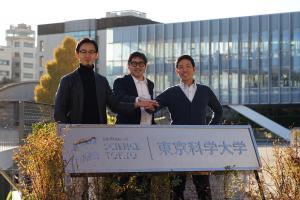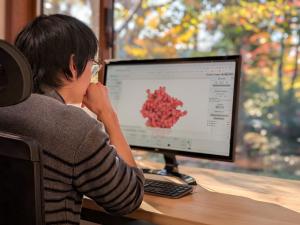
SyntheticGestalt, Asahi Quality & Innovations, and Science Tokyo Jointly Develop Next-Gen AI-Driven PET Bottle Recycling
About "Bio-Recycling"
"Bio-Recycling" is a novel method of recycling PET materials by returning them to intermediate raw materials and re-polymerizing them into new PET resin. While it fundamentally employs the same chemical reactions as "chemical recycling,"*1 it replaces the chemical decomposition process with enzymatic decomposition using bio-derived enzymes. This enables recycling at room temperature and pressure, significantly lowering the reaction temperature and potentially resolving challenges inherent in conventional methods. The project focuses on discovering novel PETase enzymes (enzymes that break down PET plastic)that can decompose PET materials with high efficiency, thereby establishing the "Bio-Recycling" method.
Roles of the Three Parties
• SyntheticGestalt:
SyntheticGestalt utilizes its proprietary AI technology, which has improved by expanding training data*2 fivefold, to explore high-functioning and high-value-added new PETase enzymes from a library of 250 million gene sequences. The company has a proven track record of using AI to discover novel enzymes, including the world's second example of a new MHETase (an enzyme critical for PET bottle bio-recycling) and four novel PETase enzymes. SyntheticGestalt is a participant in the Ministry of Economy, Trade and Industry (METI) and NEDO's GENIAC program for developing foundation AI models, and it has already developed the world's largest molecular-based AI model. The company also operates a multinational team and is part of METI’s J-Startup program.
• AQI:
Leveraging insights from its parent group’s businesses, such as Asahi Beverages, AQI will evaluate the PETase discovered in this research, including its market needs and practical application challenges. AGH’s beverage business generates significant PET bottle circulation and it has set a "Container Packaging 2030" goal to switch entirely to recycled or bio-based materials by 2030. This research is a critical initiative toward achieving these goals and supports AGH's mid- to long-term climate targets under the "Asahi Carbon Zero" initiative.
• Science Tokyo:
The Fujishima and Terasaka laboratories at Science Tokyo's Earth-Life Science Institute will lead experimental (wet lab) efforts and evaluations, drawing on their expertise in molecular evolution engineering. These laboratories specialize in identifying and modifying proteins with specific functions from millions of sequences, advancing the project with cutting-edge experimental technologies and academic insights.
Future Outlook
Currently, it is estimated that there are billions of enzymes in nature, many of which remain functionally unexplored, and it is believed that numerous unknown enzymes may outperform known ones in terms of functionality.
This research aims to efficiently discover novel PETase enzymes using AI, which can rapidly identify promising enzyme candidates from vast genetic datasets, enabling an unprecedented speed of exploration. This approach is expected to pave the way for environmentally friendly PET bottle recycling technologies.
The three parties have already discovered 10 promising PETase candidates, confirming certain decomposition functions through experiments. The Science Tokyo experimental team will further validate and refine these candidates, aiming for groundbreaking enzyme discoveries that advance practical applications. Through these efforts, the project targets the development of PETase enzymes with sufficient activity to enable demonstration-scale plants by 2026.
About SyntheticGestalt
SyntheticGestalt specializes in developing AI technologies for molecular analysis, exploration, and design. The company has created the world's largest molecule-focused AI model, presented at NVIDIA GTC 2024. Its AI resolves accuracy issues in conventional molecular AI.
One of our strengths is in enzyme discovery technology powered by AI, enabling the high-precision prediction of enzyme activity from amino acid sequences. This facilitates the discovery and modification of enzymes suited for industrial applications. Furthermore, we apply this enzyme discovery technology to analyze metabolic pathways within cells, optimizing the cultivation conditions of hard-to-grow bacteria and enhancing the biosynthesis efficiency of compounds. By implementing these technologies, we enable the transition from conventional industrial processes to bio-processes that achieve both economic viability and environmental sustainability.
Footnotes
*1: A method of recycling PET resin by depolymerizing collected used PET bottles into raw or intermediate materials through chemical processes, followed by re-polymerization into new PET resin.
*2: Data containing problems and answers used for AI training.
Kotaro Fujiyoshi
SyntheticGestalt KK
+ +81 3-4570-8634
email us here
Distribution channels: Chemical Industry, Science, Technology, Telecommunications
Legal Disclaimer:
EIN Presswire provides this news content "as is" without warranty of any kind. We do not accept any responsibility or liability for the accuracy, content, images, videos, licenses, completeness, legality, or reliability of the information contained in this article. If you have any complaints or copyright issues related to this article, kindly contact the author above.
Submit your press release

